Schools without violence Egypt
Children embrace diversity
‘Children embrace diversity' is the new training program for Egyptian school psychologists and social workers, which teaches them non-violent educational methods and values for children of primary school age. The introduction of these values should lead to the prevention of violence among children starting at a young age.
by Marie-Christine Sacher
In cooperation with the Egyptian Ministry of Education, the social training took place for the first time in Egypt during the month of October of 2019. The program was developed and conducted by the institute director of the ‘Bremen Institute for Pedagogy and Psychology’ on behalf of the Goethe-Institut Cairo. Within this program, particular emphasis is placed on teaching certain norms and values, such as the prevention of prejudice and thinking and acting in diversity, thereby strengthening social cohesion.
In conversation with some of the participants, they spoke with us about their reasons of taking part in the social training, which values, norms and coping-skills with violence they were able to learn. Moreover, they expressed their view on the importance of implementing non-violent educational methods among children of a young age, in order to prevent latter violence among the Egyptian youth.
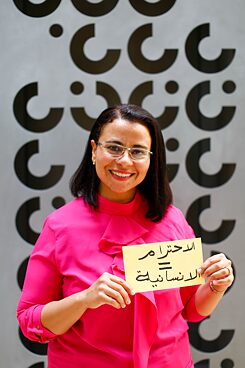 Dr. Hanan Helmy Soliman School Psychologist, Qalubiyya
| Photo: Islam Safwat © Goethe-Institut
"The program sticks out for sit content because it teaches you to see children as autonomous people and to deal with them in a respectful manner. The training also conveys values such as acceptance and fairness which are particularly missing in Egyptian schools.
Dr. Hanan Helmy Soliman School Psychologist, Qalubiyya
| Photo: Islam Safwat © Goethe-Institut
"The program sticks out for sit content because it teaches you to see children as autonomous people and to deal with them in a respectful manner. The training also conveys values such as acceptance and fairness which are particularly missing in Egyptian schools.
Since over a year I am implementing the program in my school and I could already see changes in the children’s behavior. They became more active and are now able to express their (negative) feelings in a positive manner without (emotionally) hurting other people."
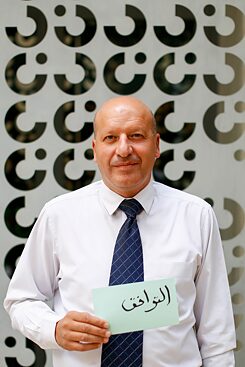 Ihab Ibrahim Al-Wazeer General Inspector for School Psychologists, Dakahliya
| Photo: Islam Safwat © Goethe-Institut
Ihab Ibrahim Al-Wazeer General Inspector for School Psychologists, Dakahliya
| Photo: Islam Safwat © Goethe-Institut
"The contents of the Fit for Life children’s program covers personal, human and societal goals. Therefore, I participated in the training in order to be able to realize these goals within my work.
Through the training I learnt to accept difference, accept compromises, not to be judgmental, to respect the emotions of my fellow human beings as well as to give constructive and positive feedback."
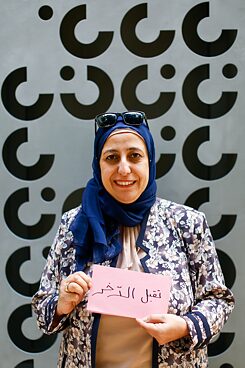 Moshira Mohamed Abdel Aziz Al Khateeb Social Pedagogue, Port Said
| Photo: Islam Safwat © Goethe-Institut
Moshira Mohamed Abdel Aziz Al Khateeb Social Pedagogue, Port Said
| Photo: Islam Safwat © Goethe-Institut
“In my opinion, non-violent education helps to raise a balanced society that is at rest with itself, respects human rights and meets others with respect and appreciation.
Thus, children are conveyed the message that violence is not the right way to express feelings or to solve problems.”
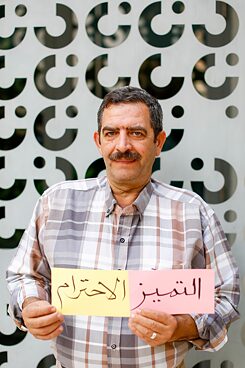 Ibrahim Youssef Ibrahim Expert for Social Pedagogues, Cairo
| Photo: Islam Safwat © Goethe-Institut
Ibrahim Youssef Ibrahim Expert for Social Pedagogues, Cairo
| Photo: Islam Safwat © Goethe-Institut
"I have participated in this program in order to combat the widespread phenomenon of violence, to help raise emotionally balanced and 'healthy' generations, and to teach the children new life skills as well as positive behaviours.
Through this program we have not only learned to respect children's rights within society, but also to teach children to treat other people with respect."
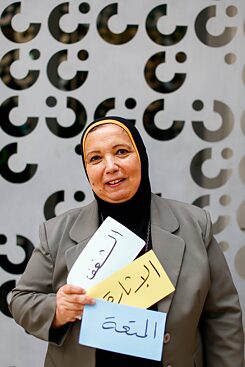 Fagr Farag Salem Ibrahim Social Pedagogue, Alexandria
| Photo: Islam Safwat © Goethe-Institut
Fagr Farag Salem Ibrahim Social Pedagogue, Alexandria
| Photo: Islam Safwat © Goethe-Institut
"Some of the most precious values that we have learned through this program are tolerance, self-confidence, acceptance of others, teamwork, how to apologize to and respect others regardless of their heritage, colour, religion, appearance or social status. These are the values we want to teach our children and I hope that together we will achieve this goal.
This program is especially suitable for primary school children, because it is only through them that we can raise powerful generations and well-educated young women and men for the future."